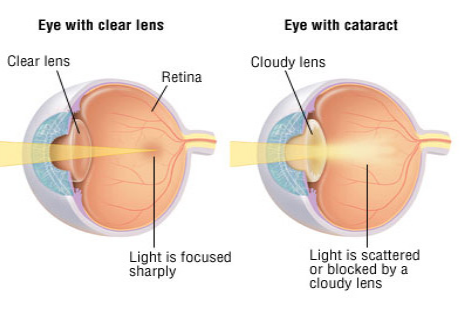Cataract Care
What is a Cataract?
Cataract diagnosis and treatment are something we are happy to offer at O’Fallon Family Eyecare.
Cataracts are simply a cloudy opacity of the lens inside the eye. They are very common as you get older. Mild cataract cause few symptoms. Often they cause your glasses prescription to change but still allow good vision.
As the cataract gets worse you may notice blurry vision or more glare, particularly while looking at lights such as car headlights or streetlights at night. Eventually cataracts will get bad enought that glasses alone won’t be able to improve your vision adequately.
When cataracts cause significant vision loss the best treatment is to have cataract surgery.

We Help You Manage and Treat Your Cataracts
It’s very easy to think of the treatment for cataracts is simply getting surgical removal. However, there are many stages of cataracts and getting cataract surgery is towards the end of those stages. This is why it’s good to have an optometrist who will be your consultant through your journey with cataracts.
Depending on the type of cataract and how much it affects your vision, treatment might range from simply monitoring your cataracts to recommending surgical extraction. Dr. Hegyi will discuss your cataracts with you and let you know what are the best options for you for the stage of cataracts.
When you are ready for surgery, the doctor will discuss options in cataract surgery. For example, there are several options in the type of lens implant you will want to consider based upon your current prescription as well as if you want to get freedom from glasses after the surgery.
Once you have discussed your surgical case thoroughly, Dr. Hegyi can make recommendations of the best surgeons for your needs as well as educating you on what to expect after the surgery.
When Should I Consider Surgery?
A cataract needs to be removed only when vision loss interferes with your everyday activities, such as driving, reading, or watching TV. You and your eye care professional can make this decision together. Once you understand the benefits and risks of surgery, you can make an informed decision about whether cataract surgery is right for you.
In most cases, delaying cataract surgery will not cause long-term damage to your eye or make the surgery more difficult. You do not have to rush into surgery.
Sometimes a cataract should be removed even if it does not cause problems with your vision. For example, a cataract should be removed if it prevents examination or treatment of another eye problem, such as age-related macular degeneration or diabetic retinopathy.
If you choose surgery, your eye care professional may refer you to a specialist to remove the cataract.
If you have cataracts in both eyes that require surgery, the surgery will be performed on each eye at separate times, usually four weeks apart.

